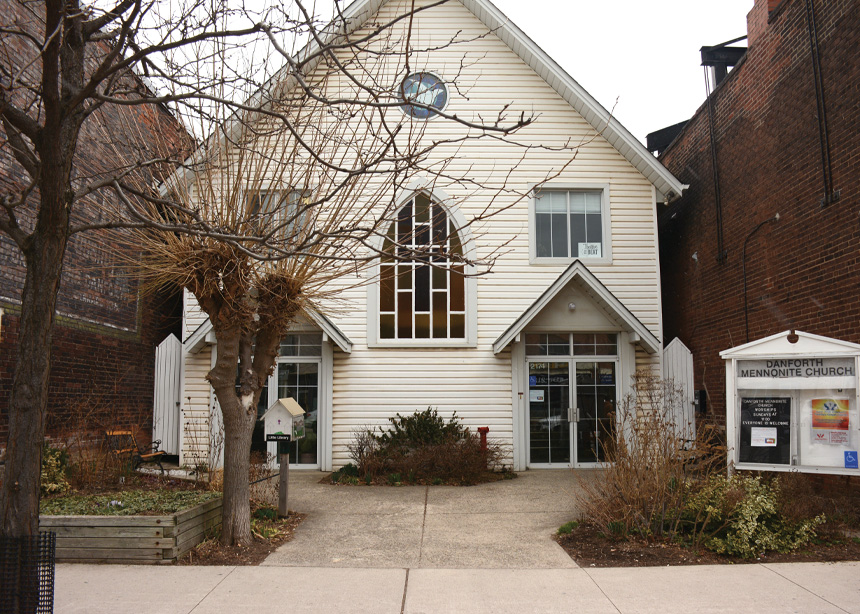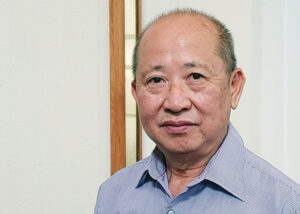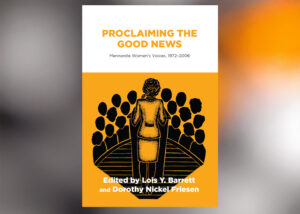When the people of Danforth Mennonite Church in Toronto realized they needed to carry on without a pastor, they took a closer look at “the things that a pastor really does.”
Mike DeHaan, who is chair of the church council, says the circulation of responsibilities officially commenced on February 1, the day after Stephen Reist’s term as interim pastor concluded.
The church is looking for a new pastor but finding ways to function well in the meantime.
Seated on a bench in the church lobby, DeHaan discussed how they broke pastoral duties down to three main components: administrative work, pastoral care and preaching.
The worship committee looks after preaching, which means tracking down available guest speakers to come at least one Sunday each month. Alternatively, they ask people within the congregation to lead a service.
They also come up with ideas for new events, as a pastor would.
DeHaan says this saves money for the church, but it also entails a lot more work for the worship team.
Average Sunday attendance is in the 30s, with another 10 joining by video call. The administrative team also ensures clear communication among the various groups and committees within the church. With respect to pastoral care, DeHaan says, “normally, you would expect a pastor to have a finger on the pulse of who
requires pastoral care.”
But in the absence of a pastor, the congregation selected four individuals to sit on the ministry support team. Keeping track of that pulse looks different now.
Shannon Epp joined the ministry support team after the gift discernment committee asked if she might consider it. “We seek to have our eyes and ears around the congregation,” says Epp one Sunday afternoon in the worship hall. It’s practical work, she adds. It means staying around before and after services to mingle with attenders.
It’s paying attention to those people trickling in before a service begins, noticing absences and remembering those not present via video call.
People who form this part of the church life must also work with a high level of discernment and coordination in determining when and how to become involved in a situation.
For circumstances that are more complex or challenging, the group discerns how to seek advice outside of the ministry support team.
The goal of every step they take is to provide people with the best help possible for their specific situation, and they must never compromise confidentiality.
Epps adds that running a church without a pastor requires a reliance on the generosity of church members. It also makes her think of the early church, a time before hierarchies emerged.
When following up with people who request prayer support, they coordinate to ensure everyone is covered to avoid scenarios where one person receives multiple check-ins and another never hears back from anyone. Not hearing back “really hurts,” says DeHaan.
All of these things combined still do not cover everything that a pastor would look after, especially one working in Toronto.
Danforth Mennonite sits within a block of a busy intersection, with people heading to or from the downtown core in their vehicles, bikes or via public transit.
The white vinyl building with stained glass windows disrupts a series of brick shops with signs of various fonts and sizes.
DeHaan says it’s not unusual for strangers to knock on the door and in one breath say, “I need to talk to a pastor,” to anyone who opens. “Our ministry is not just the people who attend church,” says DeHaan.
It’s also important to be prepared for those situations where a pastor is required by law, like weddings for instance. Deaths and subsequent funerals also tend to demand a pastor’s presence.
For these types of situations, the congregation has sought out an emergency “backup” pastor. DeHaan says it has been challenging to find someone for this role because they cannot provide a definitive term for their services.
DeHaan notes that Danforth has been accustomed to long-term pastors. One pastor led the congregation from 1964 to 1984. An interim then filled in before another pastor served pastor for 13 years. After that an interim pastor stepped in again, before Tim Reimer served from 1999 to 2021.
DeHaan says the congregation always had a team or group of people who served to support the pastor. He credits this tradition for the congregation’s ability to shoulder pastoral work now.








Leave a Reply
You must be logged in to post a comment.